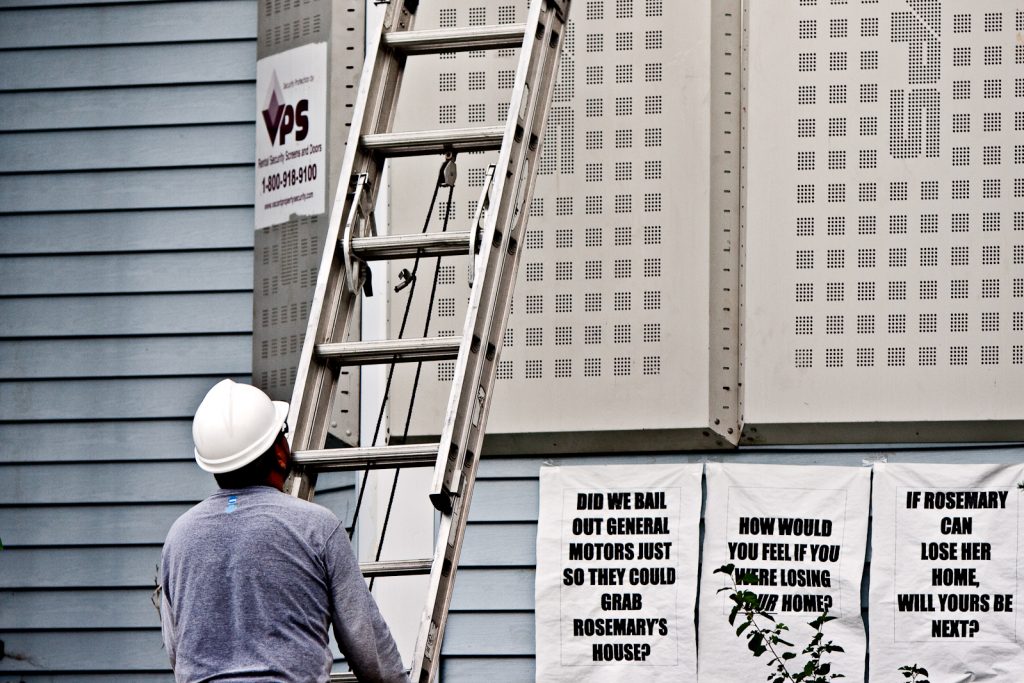Trump’s Broken Urban Promises (February)
For February 2019, the Rights Writers discuss their issues in the context of US political discourse (including public opinion), particularly in light of the two-year anniversary of Donald Trump’s presidency.
“When I look at the failing schools, the terrible trade deals, and the infrastructure crumbling in our inner cities, I know all of this can be fixed – and it can be fixed very quickly.”
Taken from a 2016 campaign speech given in Charlotte, NC before his election, this was President Trump’s hopeful basis for urban policy. Yet, despite his being the most urban President to date – a New York City resident and real estate developer – Trump’s urban agenda has been largely disappointing.
While much of city living is dictated by state and local government, Trump proposed a range of federal policy initiatives directly related to urban renewal. These included greater investment in urban infrastructure thanks to cuts in climate action funding, as well as an increased presence of law enforcement in a bid for safer neighborhoods.
However, despite the promises of increased infrastructure investment, Trump’s 2019 budget outline called for an 18.3% funding cut to the Housing and Urban Development Department – the biggest reduction since the 1980s. Not only is this damaging to cities; the proposal disproportionally impacts society’s poorest.
The $8.8 billion slash to the HUD budget primarily focuses on reducing funding for federal housing assistance programs such as Section 8 rental vouchers. Trump’s changes to this scheme, which allows 1.7 million of the lowest-income families in America to access housing, mean recipients will face rent increases of up to $1,800 a year – a devastating expense for any struggling family.
 https://commons.wikimedia.org/wiki/File:3138_Clinton_Avenue_Sealed_(3911772134).jpg Tony Webster from Portland, Oregon, United States [CC BY 2.0 (https://creativecommons.org/licenses/by/2.0)], via Wikimedia Commons
https://commons.wikimedia.org/wiki/File:3138_Clinton_Avenue_Sealed_(3911772134).jpg Tony Webster from Portland, Oregon, United States [CC BY 2.0 (https://creativecommons.org/licenses/by/2.0)], via Wikimedia Commons
This comes at a time when the US is already dealing with an eviction crisis, a topic that rose to prominence after the 2016 release of Matthew Desmond’s powerful best-seller Evicted. Drawing from his ethnographic study of Milwaukee, Desmond shone light on the plight of low-income renters across America and the importance of the right to shelter when trying to break from the poverty cycle. A report by Apartment List found that 3.7 million of America’s renters have experienced an eviction while 20% have struggled to make a rent payment.
While the data may be worrying, they also signal the failings of America’s urban policy. As Desmond explains, “We cannot talk about poverty in this nation without coming to grips with how utterly broken our housing system is for America’s poor.” That is not to say the issue began with Trump, in fact Desmond’s data focuses on the Obama-era, but despite Trump’s avid promises nothing has been fixed and his new budget proposals are only likely to exacerbate the issues.
This is not the only broken campaign promise though. In the same 2016 Charlotte speech, Trump promised that he would not “let another generation of American children be excluded from the American Dream”, with a particular emphasis on opening doors for children of color. Yet, America’s current eviction data combined with outcome projections of Trump’s HUD budget speak to a deeply contradictory story.
Irrespective of marital status, households with children were twice as likely to face eviction. Renters of color disproportionately face eviction and actually pay more for housing. Meanwhile, the recent government shut down caused HUD staff shortages leading to 1,150 Section 8 housing contracts failing to be renewed, and 100,000 low-income residents risking eviction.
Another reason Trump’s HUD budget cuts are so disastrous lies in the geography of evictions. While people often mistake expensive and largely unequal cities like New York and San Francisco to be at the root of the eviction crisis, the issue is actually concentrated in Southern and Midwestern states, like Kentucky and Tennessee. These unfortunately are also the states which will see the largest rental increases of 40-45% under Trump’s budget proposal, based on projections by the Center on Budget and Policy Priorities.
So, what can cities do to offset the impacts of HUD cuts? For a start, they could introduce just cause eviction laws. A policy supported by the National Law Center on Homelessness and Poverty (NLCHP), just cause eviction laws limit the reasons landlords can pose an eviction, yet many cities have not introduced this legislation. Additionally, in housing cases, poor residents are often not guaranteed legal representation, with New York only recently becoming the first city to ensure a right to counsel for low-income tenants.
Looking ahead to 2020, urban policy is poised to be a key distinguisher in the race to the White House. Elizabeth Warren recently announced the American Housing and Economic Mobility Act, a piece of legislation designed to counteract the far-reaching consequences of historical red-lining and ensure racial equity in housing. Last week, Julián Castro, Obama’s former Secretary of Housing and Urban Development, entered the race. Kamala Harris and Cory Booker have both proposed past bills to provide “rent relief”, while Trump recently signed an executive order to create a “Revitalization Council” focused on delivering greater investment to neglected neighborhoods. Regardless of who wins, the Presidential hopefuls will not be the ones to face the brunt of America’s failing urban policy; the poorest will.

